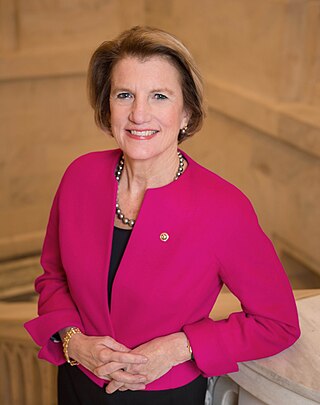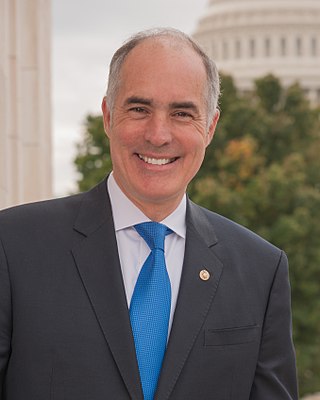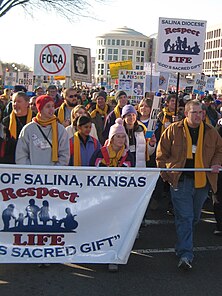Intact dilation and extraction is a surgical procedure that terminates and removes an intact fetus from the uterus. The procedure is used both after miscarriages and for abortions in the second and third trimesters of pregnancy.

Shelley Wellons Moore Capito is an American politician and retired educator serving in her second term as the junior United States senator from West Virginia, a post she has held since 2015. A member of the Republican Party, Capito served seven terms as the U.S. representative from West Virginia's 2nd congressional district from 2001 to 2015. The daughter of three-term West Virginia governor Arch Alfred Moore Jr., she is the dean of West Virginia's congressional delegation.

Susan Ellen "Zoe" Lofgren is an American lawyer and politician serving as a U.S. representative from California. A member of the Democratic Party, Lofgren is in her 15th term in Congress, having been first elected in 1994. Lofgren has long served on the House Judiciary Committee, and chaired the House Administration Committee in the 116th and 117th Congresses.

Linda Teresa Sánchez is an American politician and former labor lawyer serving as the U.S. representative for California's 38th congressional district since 2013. A member of the Democratic Party, she was first elected to Congress in 2002 in California's 39th congressional district. Sánchez serves on the Ways and Means Committee; she was the ranking member on the House Ethics Committee until 2017. In the 114th Congress, she chaired the Congressional Hispanic Caucus.

The Unborn Victims of Violence Act of 2004 is a United States law that recognizes an embryo or fetus in utero as a legal victim, if they are injured or killed during the commission of any of over 60 listed federal crimes of violence. The law defines "child in utero" as "a member of the species Homo sapiens, at any stage of development, who is carried in the womb."
Conscience clauses are legal clauses attached to laws in some parts of the United States and other countries which permit pharmacists, physicians, and/or other providers of health care not to provide certain medical services for reasons of religion or conscience. It can also involve parents withholding consenting for particular treatments for their children.
Catholic Democrats is an American not-for-profit organization of Catholics to support the Democratic Party, based in Boston, United States. The Catholic Democrats have more than 60,000 members in all 50 American states and Puerto Rico. It claims no authorization from the Catholic Church, or any Catholic bishop, Catholic diocese, candidate or candidate committee.

Americans United for Life (AUL) is an American anti-abortion law firm and advocacy group based in Washington, D.C. Founded in 1971, the group opposes abortion, euthanasia, assisted suicide, embryonic stem cell research, and certain contraceptive methods. The organization has led campaigns and been involved in judicial actions to prevent the passage and implementation of legislation that permits abortion, or may increase prevalence of abortion, including successfully defending the Hyde Amendment in the U.S. Supreme Court.

Douglas William Kmiec is an American legal scholar, author, and former U.S. ambassador. He is the Caruso Family Chair and Professor of Constitutional Law at Pepperdine University School of Law. Kmiec came to prominence during the 2008 United States presidential election when, although a Republican, he endorsed Democrat Barack Obama. In July 2009, he was nominated by President Obama to serve as U.S. Ambassador to Malta. He was confirmed by the Senate and served for close to two years as ambassador to Malta. He resigned his post effective May 31, 2011.
The Employee Free Choice Act is the name for several legislative bills on US labor law which have been proposed and sometimes introduced into one or both chambers of the U.S. Congress.
The proposed Sanctity of Life Act was a bill first introduced in the United States House of Representatives by Rep. Steve Stockman (R-TX) on July 20, 1995, and co-sponsored by Rep. Barbara Cubin (R-WY). It was reintroduced with similar text by Rep. Ron Paul (R-TX) in 2005 in the 109th United States Congress, 110th United States Congress, 111th United States Congress, and the 112th United States Congress. The repeatedly introduced bill sparked advocacy from anti-abortion activists and opposition from abortion-rights activists. The bill has never become law.
The proposed America's Affordable Health Choices Act of 2009 was an unsuccessful bill introduced in the U.S. House of Representatives on July 14, 2009. The bill was introduced during the first session of the 111th Congress as part of an effort of the Democratic Party leadership to enact health care reform. The bill was not approved by the House, but was superseded by a similar bill, the proposed Affordable Health Care for America Act, which was passed by the House in November 2009, by a margin of 220-215 votes but later abandoned.

The Respect for Marriage Act is a landmark United States federal law passed by the 117th United States Congress and signed into law by President Joe Biden. It repeals the Defense of Marriage Act (DOMA), requires the U.S. federal government and all U.S. states and territories to recognize the validity of same-sex and interracial civil marriages in the United States, and protects religious liberty. Its first version in 2009 was supported by former Republican U.S. Representative Bob Barr, the original sponsor of DOMA, and former President Bill Clinton, who signed DOMA in 1996. Iterations of the proposal were put forth in the 111th, 112th, 113th, 114th, and 117th Congresses.
The Affordable Health Care for America Act was a bill that was crafted by the United States House of Representatives of the 111th United States Congress on October 29, 2009. The bill was sponsored by Representative Charles Rangel. At the encouragement of the Obama administration, the 111th Congress devoted much of its time to enacting reform of the United States' health care system. Known as the "House bill,” HR 3962 was the House of Representatives' chief legislative proposal during the health reform debate.
The Stupak–Pitts Amendment was a proposed amendment to the Affordable Health Care for America Act of 2010 (AHCAA). It was submitted by Representatives Bart Stupak and Joseph R. Pitts. Its stated purpose was to prohibit the use of federal funds "to pay for any abortion or to cover any part of the costs of any health plan that includes coverage of abortion" except in cases of rape, incest or danger to the life of the mother. It was adopted by the House but not included in the Senate's version, the Patient Protection and Affordable Care Act (PPACA). Representatives who support abortion rights said they would oppose AHCAA with the Stupak-Pitts language, and proposed to adopt PPACA. Stupak and several supporters said they would oppose PPACA without the amendment, but withdrew their opposition after President Obama promised an executive order to bar such funding. Anti-abortion groups criticized this action, saying that the executive order would not be effective.

Robert Patrick Casey Jr. is an American lawyer and politician who is the senior United States senator from Pennsylvania, a seat he has held since 2007. He is a member of the Democratic Party.
The Catholic Church and abortion in the United States deals with the views and activities of the Catholic Church in the United States in relation to the abortion debate. The Catholic Church opposes abortion and has campaigned against abortion in the United States, both saying that it is immoral and making statements and taking actions in opposition to its classification as legal.

The political positions of Paul Ryan, the U.S. representative from Wisconsin's 1st congressional district from 1999 to 2019 and the 54th speaker of the United States House of Representatives from 2015 to 2019, were generally conservative, with a focus on fiscal policy. Ryan was Chairman of the House Budget Committee from 2011 to 2015 and of Ways and Means in 2015. Ryan was the Republican nominee for Vice President as the running mate of Mitt Romney in the 2012 presidential election.

The Pain-Capable Unborn Child Protection Act is a congressional bill that would, in most cases, make it unlawful to perform an abortion if the estimated post-fertilization age of a fetus is 20 weeks or more. The bill is based upon the assertion that a fetus is capable of feeling pain during an abortion at and after that point in a pregnancy.

The Women's Health Protection Act is a piece of legislation introduced in the United States House of Representatives aimed at expanding abortion rights established in Roe v. Wade (1973) and Planned Parenthood v. Casey (1992). It was first introduced in 2013 by Congresswoman Judy Chu and sponsored by U.S. Senator Richard Blumenthal. In the 117th Congress, the act was re-introduced in response to Whole Woman's Health v. Jackson and later Dobbs v. Jackson Women's Health Organization. In September 2021, it passed the House of Representatives by a vote of 218-211, and again by a vote of 219-210 in July 2022, but it was defeated in the Senate on a 46–48 vote in February 2022 and a 49–51 vote in May 2022.








